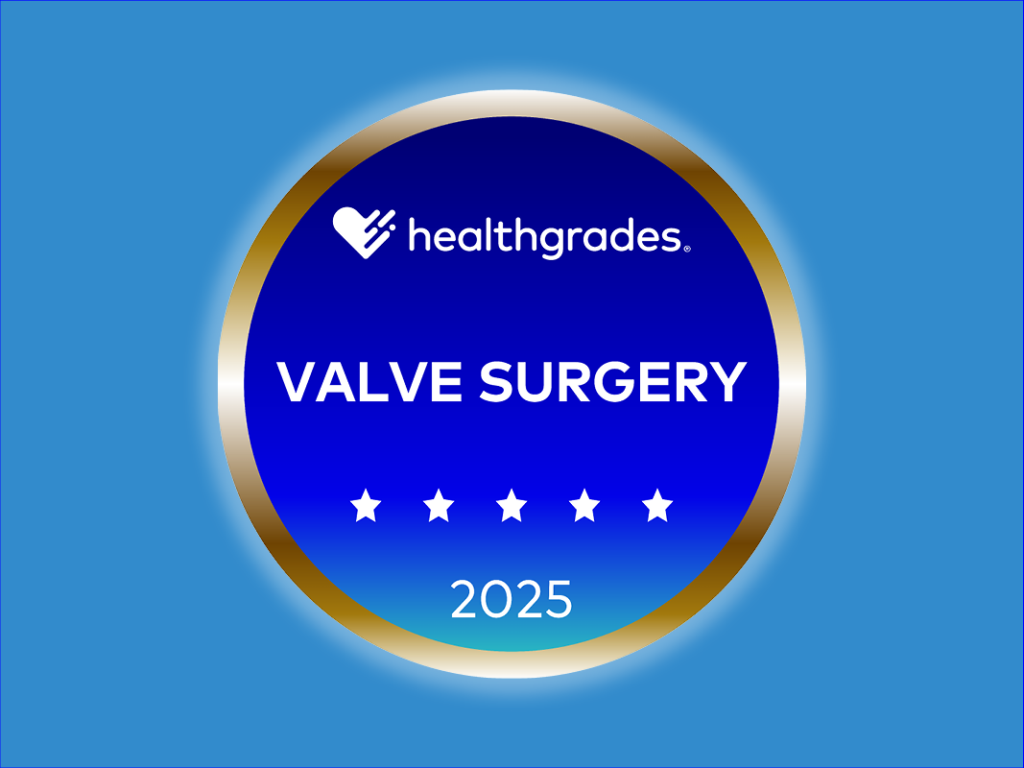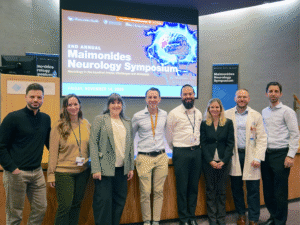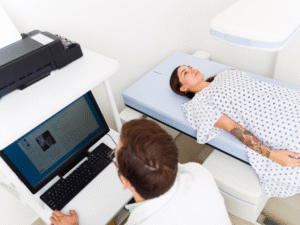Maimonides Heart & Vascular Institute is Brooklyn’s premier destination for advanced structural heart procedures, performing more than 1,000 transcatheter aortic valve replacement (TAVR) procedures since 2012. By providing this minimally invasive solution for severe aortic stenosis, Maimonides offers a vital treatment for patients who are at high or intermediate risk for traditional open-heart surgery.
“We were among the first structural heart centers to perform TAVR when it first received FDA approval and the very first in Brooklyn,” says Robert Frankel, MD, Director of Interventional Cardiology at Maimonides. “Our team’s longevity allows us to anticipate each step in the process, ensuring smooth, seamless care for those we serve.”
The team’s expertise in heart and vascular care, coupled with state-of-the-art facilities, is the foundation for Maimonides to deliver outstanding outcomes for complex valve conditions, making it a trusted partner for referring physicians throughout the region.
Comprehensive, Cutting-Edge Hybrid OR Facilities
At the heart of Maimonides Structural Heart Center are its two hybrid operating rooms (ORs), which integrate a cardiac catheterization lab with the capabilities of a full surgical suite. This advanced setup supports catheter-based and open-heart procedures, providing critical flexibility for high-risk and complex cases.
“Our hybrid ORs allow us to import previous scans and superimpose them over current, real-time images,” says Dr. Frankel. “This precision ensures optimal outcomes during procedures like valve placements.”
These capabilities are further enhanced by the expertise of a dedicated radiologist who has been with the program for over a decade. Dr. Frankel adds, “Her experience and consistency are invaluable, ensuring the highest quality imaging for every patient, every time.”
Maimonides is one of the few centers in Brooklyn to feature such facilities, with a third hybrid OR currently under construction. The hospital is also expanding its catheterization lab facilities, with three new state-of-the-art cath labs slated to open in 2025. This ongoing investment reinforces our commitment to innovation and a seamless patient experience.
“The cath lab expansions and new imaging technologies at Maimonides enable unmatched flexibility for advanced cardiac care,” says Gregory Crooke, MD, Surgical Director of the TAVR Program and Co-Director of the LVAD Program. “These innovations foster collaborative, multidisciplinary approaches, integrating interventional cardiology and cardiac surgery in hybrid environments.
“The hybrid OR’s unique design combines the functionality of a full cardiac surgery operating room with a catheterization lab. This integration allows us to deliver safer, more precise cardiac care for complex procedures like TAVR and hybrid mechanical circulatory support, which may involve both percutaneous and open approaches.”
A Seamless and Patient-Centric Approach to TAVR
One defining component of Maimonides’ TAVR program is the approach to patient care. Patients begin with a comprehensive assessment conducted in one visit by a multidisciplinary team.
“When patients arrive, they see their specialized nurse practitioner, cardiac surgeon, and interventional cardiologist in a single visit,” Dr. Frankel explains. “We’ve streamlined the preoperative testing process, so patients compete all essential diagnostics in one visit, minimizing trips and enhancing their understanding of their condition and treatment options.”
This unified approach enables faster decision making and provides patients with confidence in their personalized care.
Advanced imaging, such as CT angiography, plays a pivotal role in the planning process, helping the team select the optimal procedure route and valve type. After the initial visit, the entire team—including interventional cardiologists, cardiac surgeons, imaging experts, and care coordinators—reviews the findings and finalizes a tailored plan.
“Our multidisciplinary valve clinic brings together a full team of experts in one visit to assess and plan care,” says Dr. Crooke. “This collaborative approach saves patients time and ensures their care is seamlessly coordinated.”
Patients often present with symptoms such as shortness of breath, chest pain, or dizziness, which can be signs of aortic stenosis. These indicators are critical for primary care providers and cardiologists to monitor, as patients experiencing these symptoms may benefit from an evaluation for TAVR.
Commitment to Innovation Through Research
Maimonides is deeply invested in advancing TAVR and other heart valve procedures through research and innovation. As a participant in numerous clinical trials, Maimonides has helped develop smaller, safer catheters and continues to play a role in the evolution of valve technology.
“We’ve been involved in clinical trials from the start, working with companies to refine these devices and improve patient safety,” Dr. Frankel says.
“A dedicated team ensures clinical trials follow rigorous protocols, generating high-quality data and advancing patient care,” says Dr. Crooke.
Outstanding Nursing Care at Every Level
Beyond research, Maimonides is proud to offer exceptional nursing care across every stage of the patient journey. From the catheterization lab to the hybrid OR, and cardiac surgery ORs, nursing teams collaborate seamlessly with specialists to ensure the highest standards of care and optimal outcomes. This multidisciplinary teamwork is essential during advanced procedures like TAVR, where precise coordination is critical to patient outcomes.
Following procedures, patients recover in the cardiac surgery ICU, widely recognized as the best in Brooklyn and among the finest in New York City. This state-of-the-art unit is staffed by highly skilled nurses who deliver unparalleled care to critically ill patients, combining clinical expertise with compassionate support.
“Our nursing teams are second to none,” says Dr. Crooke. “Their dedication ensures the best outcomes and comfort for every patient.”
Coordinated Care Team Approach
Maimonides’ TAVR program benefits from a cohesive team of specialists who contribute to an excellent patient experience, from consultation through recovery. The team, which includes interventional cardiologists, cardiothoracic surgeons, radiologists, echocardiographers, highly skilled and compassionate nurses, and dedicated heart coordinators, has worked together for over a decade.
“This longstanding team synergy means we can anticipate each step, enhancing safety and efficiency for our patients,” says Dr. Frankel. “The patients and their families feel that personal connection because we, the attending physicians, are there at every stage—from consultation to the procedure and follow-up.”
This coordinated care model is a key differentiator for Maimonides. It ensures patients have access to the experts involved in their treatment and provides continuity of care that leads to better outcomes.
Personalized Follow-Up and Support
The Maimonides TAVR team prioritizes thorough education and continuous support throughout a patient’s TAVR journey. Dr. Frankel says this is another program standout. “We have two full-time structural heart coordinators who are constantly in touch with patients. We want them to understand the procedure and feel comfortable, so we’re always available for follow-up questions, even if it means doing FaceTime calls with family members.”
The follow-up process at Maimonides extends beyond the procedure, with structured check-ins at 30 days and 11 months, ensuring the new valve functions well, and the patient’s recovery is on track. This thorough approach also includes educating patients on post-procedural care, such as dental hygiene, and avoiding specific activities to prevent infection.
“We call referring doctors ourselves—no nurses, no residents—to keep them updated on their patient’s progress every step of the way.”
Specialized Capabilities in Structural Heart Care
Beyond TAVR, Maimonides’ structural heart program provides solutions for routine and complex heart conditions and procedures. These include advanced mitral valve repair with the MitraClip, atrial septal defect (ASD) to close abnormal openings between the atria, and patent foramen ovale (PFO) closures that repair a small hole in the heart. “We also implant the WATCHMAN device, which helps people with non-valvular atrial fibrillation (AFib) reduce the risk of blood clots without the use of lifelong blood thinners,” Dr. Frankel explains.
Additionally, our heart and vascular team collaborates closely with neurology specialists to address cases where cardiac conditions, such as PFO, may contribute to stroke risk.
“For example, young patients with strokes may have a small heart opening—a ‘trapdoor’ that allows clots to pass and reach the brain,” Dr. Frankel adds. “We work with neurologists to identify and close these openings, markedly reducing the risk of recurrent strokes. It’s an approach that goes beyond routine structural heart care and highlights our commitment to holistic, multidisciplinary solutions.”
Maimonides is a Destination for High-Risk Cardiac Patients
As a high-performing center of excellence, Maimonides is equipped to treat patients who may not qualify for traditional surgical options. The TAVR program’s tailored assessment and risk management protocols ensure even the highest-risk patients receive safe, effective care.
“For high-risk patients, our TAVR program offers a minimally invasive alternative that significantly reduces recovery time and complications,” says Dr. Crooke. “Our approach ensures decisions are made objectively and always in the patient’s best interest, free from bias toward any one treatment option.”
With the highest quality ratings in TAVR outcomes and a program focused on innovation and patient-centered care, Maimonides offers an ideal choice for physicians considering referrals for patients with complex heart conditions.
Connect your patients with Brooklyn’s leader in minimally invasive valve replacement. For more information on our Structural Heart Center, visit https://maimo.org/treatments-care/heart-vascular-institute/structural-heart-center/. To refer a patient, call (718) 283-7364.




